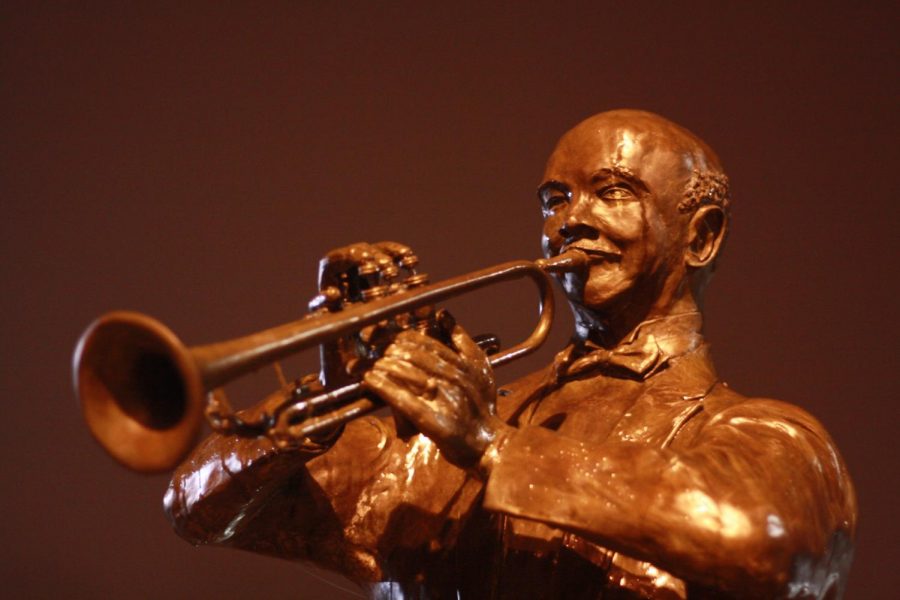W.C. Handy continues to influence musicians today
February 23, 2019
Throughout his life, the Father of the Blues faced many obstacles, including racism and homelessness.
The W.C. Handy Music Festival is an annual 10 day series of events held in northwest Alabama, which typically takes place in late July. The festival was named after William Christopher Handy, born 1873 in Florence, AL. Handy became known as “Father of the Blues” and was the first to present that genre of music to the world in the form of sheet music.
Handy’s interest in music began as a child and was almost stifled by his family and church. Once, his father forced him to return his guitar and exchange it for a dictionary. However, this did not stop him from pursuing music.
His fervor of the blues began at a railway listening to a black man, dressed in rags and holey shoes, strum his guitar with a knife. Handy called it “the weirdest music he had ever heard”, according to msbluestrail.org.
W.C. Handy Festival Chairwoman Tori Bailey said Handy was quite the trailblazer, making history in several ways.
“From being the first to capture the unique black music sound, interpret it in a written format and sell it as sheet music to establishing a music publishing company, which is still owned and operated today by his family,” Bailey said. “From here, he became a pioneer in the area of publishing with his role at ASCAP (American Society of Composers, Authors and Publishers), to traveling internationally and constantly reinventing his sound and style.”
In the musical documentary “Mr. Handy’s Blues,” music historian Elliot Hurwitt said Handy took something that was considered a rude, lowdown musical form only suitable for juke joints in the South and regularized it, formalized it and in doing so, popularized it.
Hurwitt said Handy’s contributions to American culture are vast and as people alive during his time began to pass away and forget about his accomplishment, it is time to focus on who he was and the wonderful things he did for the world.
American singer-songwriter John Lee Hooker Jr. said the blues is the foundation to every music, every genre of music that we listen to today.
“The first annual W.C. Handy Music Festival was presented by the Music Preservation Society, Inc. in the summer of 1982,” Bailey said. “Prior to then, there had been celebrations in honor of William Christopher Handy presented by others, but this was the first continuous annual festival in his name, and is today the only annual celebration other than a birthday party held each year at the Handy Museum in Florence. It celebrates not only the legacy of the man himself, but pays homage to the Shoal’s musical heritage.”
She said although she has been involved with the festival for many years, she is often moved by the way music touches so many different groups.
“Seeing a child ‘compose’ a tune while working alongside a professional musician,” Bailey said. “Some who attend public events don’t realize that since seniors in nursing homes are unable to attend events, we take mini concerts to them. There are heart touching stories about seniors in nursing homes who had been largely unresponsive, but who reacted to music. Sometimes UNA students who have their own bands will set up and play during the few quiet times during the festival. Other times, those bands are so good that we’ll add them to the line-up of events that are already set up.”
Bailey said UNA presents Handy events during the festival also and several students over the years who put together events that drew younger people.
Many residents attend the W.C. Handy Festival for its live performances, its soulful atmosphere and its carnival foods, although tourists may be attracted to the festivals culture and inheritance. Not only this, but they also may be drawn to the Shoal’s evolution of music and diversity.
W.C. Handy’s impact in the Shoals area shows throughout the community.
It does not stop with the W.C. Handy Festival, instead his influence carries over to a number of states. Mississippi, Tennessee and Alabama, they all pay tribute to Handy with their statues, museums and head start program.
By doing so, Handy’s legacy continues to live on.


